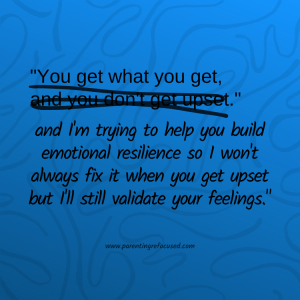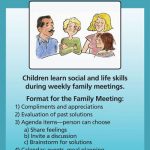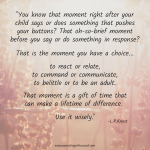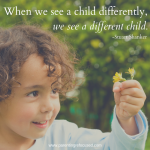Okay, that’s not quite as easy or rhyme-y. And it sounds fairly ridiculous so I’d never actually say it like that. But the original phrase has bothered me for awhile.
Although I agree with the overall message that we can’t (and shouldn’t) always let our kids decide, I don’t think there’s anything wrong with them getting upset about it. We all get upset about things. It’s a reasonable response to a stressful experience.
And it’s also an important part of developing resilience, self-regulation, and empathy.
But we’re usually taught (consciously or subconsciously) that negative emotions are wrong or bad. They don’t feel good, and we all typically prefer feeling good. So we often go out of our way to avoid feeling upset, and try to stop our children from feeling it too. We’re even hard-wired to respond and help when we hear them in distress.
Unfortunately, this avoidance can lead to bigger problems. How can we learn to manage our feelings if we’re not allowed to feel them? If we want to get better at something we need to practice, and that goes for handling negative emotions too. Feeling upset- sad, worried, disappointed, even angry- and then getting back to calm over and over is how we learn how to make it through difficult times. If we skip the feeling, we skip the growing.
In the moment though it just feels like they’re overreacting. Why in the world would anyone be upset about getting the wrong cup? It can be so difficult (and annoying!) to hear our children crying or whining over something we think is unimportant. But they’re still learning about big vs small problems, and their perspective is based on their limited experience. Getting to pick which cup they want really does feel like a big deal, especially when so many other choices are already made for them all day.
And even if it’s not a big deal, everyone appreciates having their feelings validated. No one likes to hear that they’re upset over nothing- even if it’s true. Often that kind of upset is from an underlying concern anyway, so it’s easier to address it if we acknowledge their feelings first. Then we can move on to teaching them that even though it’s okay to feel upset, we still need to find appropriate ways of expressing and processing it.
Putting It Into Practice
If we want to help our children learn how to manage their feelings respectfully, it’s easier to address their concerns (and ours) once we’ve all calmed down a bit.
If they’re emotional and in their right brain, we first need to connect with them on that right side by offering a hug and validating their feelings:
“Wow, you really wanted that red cup! I can see how sad you are about getting the green one instead. There’s lots of times that I feel sad too. Then I try to take some deep breaths until I feel better. You want to try with me?”
These are a few fun variations of deep breathing that you can do with younger kids. It helps to practice them when they’re already calm, but you can also introduce them when they’re having trouble:
- Breathe in like they’re smelling a flower and breathe out like they’re blowing a dandelion (teach them to hold their hand up for visualization)
- Have them lay down and place a stuffed animal on their tummy as they breathe in and out and watch it rise and fall
- Breathe in and out as they trace along the outside of their hand starting at the wrist by their thumb- up to the tip of their thumb on the inhale, down the inside of their thumb on the exhale, up to their first fingertip on the inhale, down the other side on the exhale, continuing around every finger and then heading back the way they came (will be 10 breaths)
As we see them calming down, we can help them move back to their left brain and start discussing potential solutions. Sometimes they like to help with writing these down on a piece of paper or the computer:
“What could you do next time if there’s a cup you’d really like to use?”
“What if you still don’t get the cup you want?”
When they’ve calmed down enough we can discuss our bigger concerns about the situation (this could be right away or it could be later, depending on the child and how upset they were):
“I really appreciate how hard you worked on that plan with me. It’s okay for us to feel upset, but we still always need to be kind and respectful. How do you think I felt when you yelled at me about your cup?”
“Yeah, I felt sad. I don’t like being yelled at. It’s not okay to yell, even if we’re really sad or mad. What happens if I do something unkind like yell at you? What do I do then?”
“That’s right, I find a way to apologize and try harder to stick with my plan next time. What can you do to make things right and fix this mistake?”
It does take longer- just like my silly altered phrase- but it pays off in the long run. Eventually children learn to do all of this on their own, and even get upset less over “little” things.
Of course some days I just remind them- “You can’t always get what you want.” Just as memorable, but a bit more reasonable (and I still throw in some validation too).
I usually sing that one though. And then we start dancing. You’re welcome for having it stuck in your head now
Thoughts? Are there any phrases like this that you’ve changed?
**All examples are included as general guidelines- they’re not meant to be used as scripts. You know your child and the situation best, and can work on applying the parts you find helpful to create your own personal response.









Comments